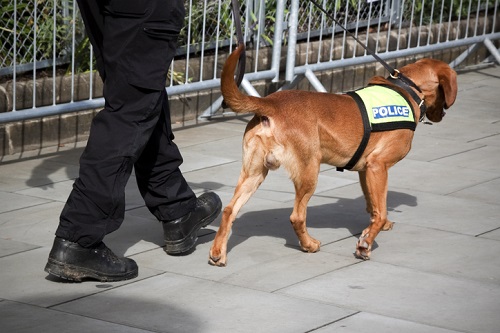
Drug-sniffing dogs could soon be deployed to South Australian schools to detect illicit drugs under new protocols being developed by the state’s education department and police.
When implemented, this will allow the state’s high school principals to “proactively invite” Passive Alert Drug Detection (PADD) dogs on to school grounds. Private schools can also opt in to the program.
Under the protocol, developed during 2018 by the Education Department and SAPOL along with other stakeholders including the non-government school sector, students will be assembled away from the buildings while the operation takes place.
South Australian Education Minister, John Gardner, said the Government made the decision as part of its ongoing effort to “stop the scourge of drugs in schools”.
“We are taking strong action to protect our children from illicit substances which we know can interrupt learning, impair development and result in social, emotional, financial and health problems that continue into adulthood,” Gardner said.
“This policy has a significant educational component, and a number of schools who have received visits by PADD dogs in the past have reported the experience to be a positive and educative process for the whole school community, whether or not drugs have been found.
Gardner added that while the majority of South Australian students are not involved with these activities the Department was “very serious” about deterring young people from having any involvement with illegal drugs.
South Australian Secondary Principals Association president, Peter Mader, said the state’s principals take their responsibilities for providing a safe and orderly environment extremely seriously.
“It has been common-place for principals to take a strong stance in response to illicit drugs being found on school premises and, consequently, rates and severity seem to have lessened,” Mader told The Educator.
“So, the SA Government’s announcement that Passive Alert Drug Detection [PADD] dogs would be made accessible to those secondary principals interested in inviting SAPOL to their school, adds another dimension to an already effective strategy.”
SA Minister for Police, Corey Wingard, said the South Australian Government had a “zero-tolerance” attitude towards illicit drugs.
“Illegal drugs have no place in our society, and in particular no place anywhere near our vulnerable children,” Minister Wingard said.
“These new measures send a clear message to anybody who thinks they can bring drugs into our schools that they will be caught, and they will face the consequences.”
Assistant Commissioner Noel Bamford welcomed the development of the protocol to ensure that action of this type is carried out in an appropriate manner.
“Illicit drugs have no place in our schools,” he said.
“I would remind anyone considering taking illicit drugs onto any school property that the consequences of using drugs or being caught in possession of them can be serious and long lasting, including the possibility of criminal conviction.”
Assistant Commissioner Bamford urged anyone with information about the sale, possession or manufacture of illicit drugs to call Crime Stoppers on 1800 333 000, adding that information can be provided anonymously.


